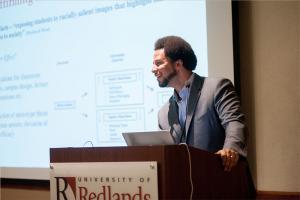Education professor J. Luke Wood has spent years researching and talking about the challenges male students of color have in pursuing and attaining a college diploma — family income, social stigmas, complicated experiences in elementary and high school.
On Wednesday, he shared what he’s learned with about 80 students from 10 area community colleges gathered for Elgin Community College’s first-ever men of color summit.
“It shows them it’s not them,” Wood said of the summit’s purpose. “A lot of times how oppression works is it makes you feel like there is something wrong with you, that you’re not doing something right.
“You begin to think it is you, that the problem is you,” he said. “When you start to realize that it is not you, I think there’s a sense of empowerment that comes with it.”
ECC officials invited Wood, an education professor at San Diego State University, to headline Wednesday’s summit. Besides teaching, Wood is the co-director of the Community College Equity Assessment Lab, a national research center that studies the factors affecting boys and men of color in their pursuit of education, graduation and diplomas. The group has compiled findings based on data and training partnerships with more than 150 schools, colleges and universities.
Wood shared some of the assessment lab’s key findings at Wednesday’s event.
Many male students of color go to college by taking out student loans and or working jobs, he said. Some don’t have an easy mode of transportation to get to school while others are carrying a lot of emotional scars from the disproportionate discipline they received in elementary, middle, and high schools compared to their white counterparts, he said.
And when the going gets tough, some find it easier to give up than to ask for help, Wood said.
“Being too proud to ask for help means that I might not eat.” he said. “And if I might not eat, then it will be harder for me to focus on school.”
Some of those in attendance said they could relate to what Wood was saying.
Joel Angeles, a student at McHenry County College, said he believed the education system is “flawed” if it depends on students sitting and learning in a classroom setting from an early age and into adulthood. Fellow student Jorge Acosta shared how important it is for a teacher to be able to relate to underrepresented students.
 Some in the McHenry group talked about the difficulty of being a first-generation college student and not knowing anyone who has gone through the collegiate system.
Some in the McHenry group talked about the difficulty of being a first-generation college student and not knowing anyone who has gone through the collegiate system.
Earlier this year, ECC adopted a program called Triumph — Transforming and Inspiring Undergraduate Men Pursuing Higher Education — a mentorship program for male students of color.
Gregory Robinson, ECC’s assistant vice president of student services and development and dean of students, said the summit was meant to further assist the Triumph students in their growth and development. Part of its mission is for participating students to gain knowledge on how to overcome those things that might prevent them from going to college or finishing, he said.
Triumph students will do a presentation on what they learned from the summit for ECC officials and possibly the ECC board of trustees at a later date.
“The colleges are going to listen to the students before they listen to us, even as an administrator,” Robinson said. “I think if it comes directly from them, the administration will be more open to it.”
ECC President David Sam said summits and conferences like the one held Wednesday are important to remind students they belong in a higher education institution, despite any adversity they may face.
“When you graduate, I want to see you at commencement, to walk across the stage,” he told the students. “You’re doing it for yourself, for your families and other people. It’s an inspiration to others. ‘If he can do it, so can I.'” website

